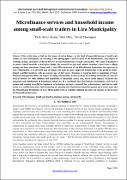Microfinance services and household income among small-scale traders in Lira Municipality

View/
Date
2020Author
Owani, Dick Denis
Oboi, Alex
Mwesigwa, David
Metadata
Show full item recordAbstract
This article aims to find out the impact of micro finance on the level of household income of small scale traders in Lira Municipality by focusing at the demographic characteristics of the beneficiaries; and impact of training, savings, and micro-credit on the level of household income of small scale traders. This study is qualitative in nature, biased towards a descriptive design, the research targets and extracts secondary data from a village savings and loan association Group and a Loan Office from one of the Microfinance Institutions that operates in Lira Municipality. It is revealed that 28 female and only 02 men comprised membership to the group of multi-lingual youthful members with an average age of 32.9 years. Training is found to lead to acquisition of basic financial management skills; the impact of savings on members is seen in terms of enabling households to raise the level of literacy for their children and acquisition of household assets; and, micro-credit impacts facilitates the expansion and stabilization of household enterprises. It is concluded that Microfinance Institutions work best in groups and training is useful for beginners in businesses, savings is essential for re-investments, and micro-credit serves as a stabilization fund. More branches of microfinance institutions should be opened-up in rural areas and the Microfinance Institutions in Lira Municipality need to consider stepping-up their out-reaches to rural areas for financial inclusiveness.
Collections
- Research Articles [139]
